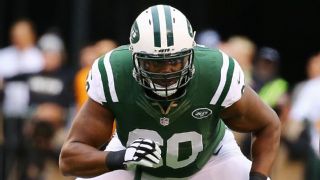|
For 10 years, D'Brickashaw Ferguson showed up for work every day -- not just every Sunday, but Monday to Saturday too. He never got hurt, never called in sick, never got in trouble, never made headlines outside the sports section. He was the ultimate professional. Because he never revealed any fire, he appeared almost robotic at times. He did his job -- and did it well -- but you always wondered if he truly loved football. Turns out he loved it more than he let on. Quietly competitive and ever the perfectionist, Ferguson saw what we all saw last season -- slippage in his game. It happens to the greatest of athletes. Most of them continue to play, trying to squeeze as much money as possible out of their sport before it casts them aside. Ferguson could've done that. He could've accepted a pay cut from the New York Jets and stuck around for the year, adding another few million to his $67 million in career earnings. But Ferguson didn't want to be That Guy, the guy who hangs on. If he couldn't play up to his usual standard, he didn't want to play at all. He loved the game too much to cheat it, so the prideful left tackle from suburban Long Island -- drafted by his hometown team in 2006 -- has decided to retire. Stand up and cheer. Ferguson deserves your applause because he did it the right way. He was the Jets' version of Lou Gehrig and Cal Ripken Jr., never missing a game or a practice. He started 160 regular-season games and another seven in the playoffs, never sustaining an injury that warranted a mention on the injury report. They say the NFL has a 100 percent injury rate. Not true. Because of Ferguson, it's 99.99999 percent. He gave everything to the organization, which undoubtedly will honor him one day with a place in the Jets' Ring of Honor. It's good to see Ferguson leave with his health intact, as there have been too many premature retirements in Jets history. Al Toon and Wayne Chrebet walked away at 29 and 32, respectively, because of post-concussion syndrome. Curtis Martin was forced out at 32 because of a chronic knee condition, one year after winning the NFL rushing title.  Ferguson's longevity is somewhat ironic because, when he came out of Virginia in 2006, there were rumblings about his lack of passion for football. He can be too passive at times, some scouts said. I remember one of his first days in training camp. An old offensive line coach named Tony Wise lit into Ferguson during a pass-blocking drill, questioning his intensity. Whatever Wise said, he pushed the right button. Ferguson mauled the next few pass-rushers, unleashing a never-before-seen fury. Ferguson's longevity is somewhat ironic because, when he came out of Virginia in 2006, there were rumblings about his lack of passion for football. He can be too passive at times, some scouts said. I remember one of his first days in training camp. An old offensive line coach named Tony Wise lit into Ferguson during a pass-blocking drill, questioning his intensity. Whatever Wise said, he pushed the right button. Ferguson mauled the next few pass-rushers, unleashing a never-before-seen fury.
Afterward, Ferguson downplayed his stunning display on the field. He downplayed just about everything. Always cautious of the media, he measured every word, seemingly trying to avoid controversy. As an interviewer, it was maddening at times, but he seemed to relish the idea of speaking without saying anything. He'd be the ideal politician, and it wouldn't surprise anyone if he decides to enter that arena. There was always something different about Ferguson. Yes, he loved football, but he didn't live for football. He gave that impression from the moment he walked through the door in 2006. He's always had a Curtis Martin-like quality about him -- fiercely committed to the sport, but someone whose aspirations transcended the game. He's is an intelligent, well-educated man who recognizes there's life after football. Stepping out of character, he spoke out last December after the release of the movie "Concussion," expressing concerns about the long-term impact of head trauma. He was asked if the fear of chronic traumatic encephalopathy (CTE) would cause him to consider retirement. He hedged. "That's a hard question to answer," he said. "I think there are a lot of factors go into answering a question like that. I think because I've played so much, it does make you wonder, 'Wow, is [CTE] potentially something that could happen to me? Have I put myself in harm's way and don't necessarily know the implications of what I've been doing?' That's a thought I'd have to consider, because there's no real answer to that." This one time, his non-answer was telling. People who know Ferguson believe he was influenced by what happened to former teammate Alan Faneca in 2010. An aging Faneca, an all-time great offensive lineman, was unceremoniously cut during the draft. The Jets strung him along through the offseason, then dumped him as soon as they picked his replacement, Vladimir Ducasse, in the second round -- a future bust, as it turned out. Several players felt Faneca was mistreated by the organization, and it apparently didn't sit well with Ferguson. That was two administrations ago. He doesn't have to worry about that happening to him; he's going out on his terms. For the first time in a decade, someone else will line up at left tackle for the Jets -- and the sight of it will be surreal.
|
